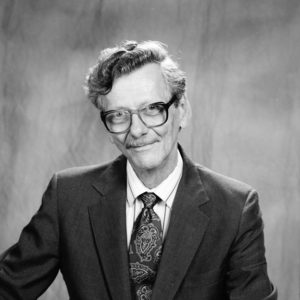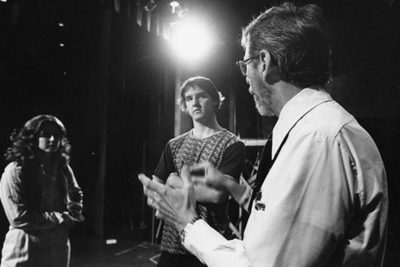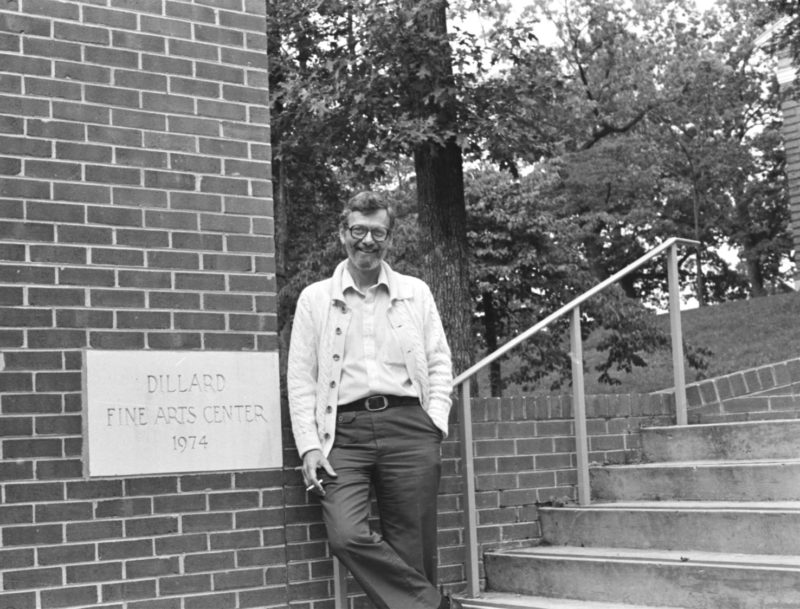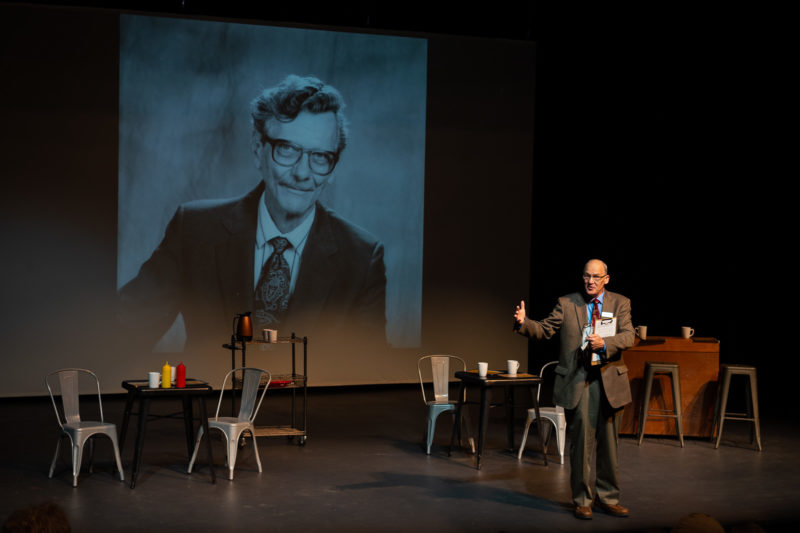For those who knew him, there was nothing Doc Hailey couldn’t do.
“My mom used to say he was not smart enough to know that there was anything he couldn’t do,” Lavinia Garbee ’90 MEd said of her father, the University of Lynchburg’s first theatre professor, Dr. Robert Carter “Doc” Hailey Sr.
“He could sew and hang wallpaper and refinish furniture. Nothing seemed too big for him. He’d just do it. He’d take fabric, $20 a yard, and just cut into it. He baked cakes for our birthdays. … I would call him larger than life in some ways. He loved his family, he loved his students. He was a great human being.”

On Oct. 16, during Homecoming, the Dillard Fine Arts Center main stage theater was renamed for Hailey, who died in 1998. Many of his former students attended the dedication ceremony, along with four of his five children, Carter, Bev, Chris, and Lavinia. Hailey’s wife, Beverly, died in 2015, and a son, Haskins, died a year later.
Although there have been plays at Lynchburg since 1903, when the school was founded as Virginia Christian College, there was no theatre department before Hailey arrived on campus in 1949. Over the next 44 years, the Texas native and Baptist minister’s son would build one of Lynchburg’s most popular academic programs.
“He essentially started with nothing, and when he retired in 1993, the Dillard Fine Arts Center was regarded by many as proof that dreams really do come true,” Dr. Clifton Potter ’62, a former student and longtime history professor at Lynchburg, wrote in The Critograph in 2018.
“Of course, Bob did not accomplish great things without the help of hundreds of students and faculty members, but he was like the Pied Piper.”
One of these students was Andy Tatom ’78, who described Hailey as “thoughtful, kind, generous, intuitive, pensive, and inspiring.” He admitted, however, that when he thinks about Hailey these days what often comes to mind is Doc Holliday, the infamous gunslinger, dentist, and gambler of the Wild West.
“He was cool under pressure and could put you in your place with a phrase and a twinkle in his eye,” Tatom said of Hailey, adding that he would often “hike up his pants” and deliver a good-natured insult: “What abysmal poverty of mind.”
Bill Bodine ’78 fell a willing victim to Hailey’s witty barbs, too. “He was a patient teacher who really knew how to work with his students,” he said. “He would tease us if we did something dumb on stage by saying, ‘What abysmal poverty of mind’ in his best academic tone, which always cracked me up.”
Perry Payne Millner ’86 recalled Hailey’s “droll sense of humor” and “wicked wit,” but also found him a “very formal person, very proper, and refined. … He had a resonant, actorly tone, and his gestures were larger than life, as if he were always playing to a large house, even if you were having a one-on-one meeting in the vaguely organized chaos that was his office.”
Millner added that one regret Hailey expressed was not ever playing the title role in William Shakespeare’s tragedy “King Lear.” She said he’d sometimes remark, “I could have played Lear. I would make a wonderful Lear.”

Tatom, now a physical therapist, recalled another of Hailey’s oft-used sayings, “A short pencil is better than a long memory,” and said, “I still quote him to this day to my patients. He also used to say, ‘There are no small parts, only small actors,’ which resonated with me since I was usually the shortest male in the cast.”
One show Tatom performed in was “Godspell,” a musical based on the Gospel of Matthew. Never deterred by a challenge, Hailey took the show on the road. “I remember when we took ‘Godspell’ on tour up the East Coast, doing 21 shows in 23 days,” Tatom said. “How he was able to herd all the cats so no one got lost and keep to that schedule was impressive.”
Hailey’s son Carter said his dad considered “Godspell” his “biggest public triumph,” but that he was “always doing new stuff, kind of cutting-edge stuff, controversial stuff. … He was always at the forefront of what was happening in theater. Within a couple of years of plays being on Broadway, they would be on his stage, over and over.”
Carter Hailey and his siblings sometimes ended up on their dad’s stage, too, a ready stable of actors any time the cast called for children. As Potter put it in his Critograph piece, “Bob considered his five children to be his greatest success — he once said that he had raised a perfect cast, with two roles for females and three for males.”
In 1959, three of the little Haileys played Okinawan children in Lynchburg’s production of “Teahouse of the August Moon,” sharing the stage with a goat. “In the play, there was a goat, a real goat,” Carter Hailey said. “Every night before the play, my mom would get us dressed up for the play and then we would go to a farm and pick up this goat, whose name was Duncan.
“We had a station wagon and she would drive with three little kids to this farm and pick up Duncan the goat and deliver him to the theater. You had to walk [Duncan] up several flights of stairs. [The theater] was on the second floor of Hopwood Hall and you entered from the back of the building.”

Each night, Duncan was coaxed onto stage with an army helmet full of Pepsi. “A student named Ronny Huddle worked with Duncan,” Potter, the play’s house manager, said. “Ronny met Bev Hailey every night and took charge of Duncan, who was a very gentle creature.
“He discovered Duncan’s preference of drink. Duncan rejected water and Coke, but he embraced Pepsi, being ‘young and fair, and debonair,’ a true member of the Pepsi generation. After his curtain call each night, Ronny escorted him to his waiting limousine, and Bev Hailey returned Duncan to his rural retreat.”
Carter Hailey added that including a live goat in the cast “certainly speaks to Doc’s sensibilities in a way — that he would go that far to create the effect in the play.”
Fifty years later, it’s this resourcefulness that still stands out to Gil Hanke ’72. “He did amazing work on a stage that had little space and many limitations, but the audience saw only a great set and a great performance,” Hanke said of the tiny Hopwood stage, that sat only 18 inches off the floor.
“I remember one of the shows required a marble fireplace. The piece was made in the shop. Dr. Hailey began to paint it one afternoon. It was amazing. After the show, several people from the audience wanted to buy the marble fireplace, and they were shocked that it was a wooden prop.
“He had a gift to see a big picture on a small stage and was an artist who brought every detail to show.”

For Bodine, it’s the seed Hailey planted in his students that he’ll never forget. “Doc started the theatre program at the old Lynchburg College and kick-started hundreds of us into a lifelong love of the theater,” said Bodine, who still appears in University and community theater productions.
“He changed my life in wonderful ways, as he did for many others. That theater should be named for him for those reasons.”
Among the stories Carter Hailey told at the renaming ceremony was one about how his family might not have ended up at Lynchburg at all, if it not for a “happy accident.”
In 1948, while working on a master’s degree at Miami University in Oxford, Ohio, Hailey decided to produce “The Green Pastures.” In the Pulitzer Prize-winning play, an all-Black cast retells Old Testament stories. It was the final requirement for Hailey’s degree and a controversial choice at an all-white college.
“He chose ‘Green Pastures’ because it gave an opportunity to Black actors that they would not otherwise have had,” Carter Hailey said, “and because it was a play that resonated personally for him, considering his background as a preacher’s son.
“He chose ‘Green Pastures’ because it’s a play that entertains as it teaches, because it would be a challenge to direct, and because he thought it would be good theater. And I have it on excellent authority — my mother’s — that it was an excellent production that audiences found both funny and moving.”
The play did not, however, sit well with the university’s administration and Hailey was given an F. It looked like his academic career was over, but unbeknownst to Hailey, Bev Hailey went to bat for her husband with the head of the drama department, pleading that he be given a second chance.
“Fortunately, for all of us, her entreaties were successful,” Carter Hailey said.
Hailey graduated a year later, the same year there was an opening on the faculty at a small, Virginia liberal arts college. “[In] 1949, he was hired to teach English and theatre at Lynchburg College, a job that would not have been available had he graduated on time,” Carter Hailey said.
“So that was the happy accident that brought Bob and Bev to Lynchburg College.”

